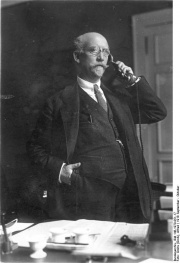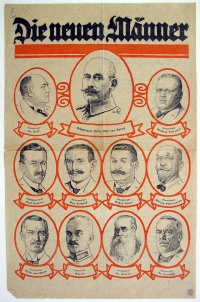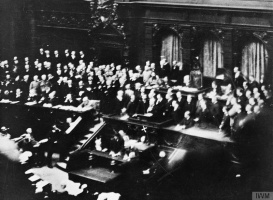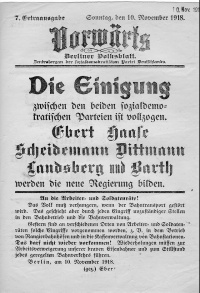Career before the War↑
After August Bebel (1840–1913), the chairman of the SPD, died in 1913, Philipp Scheidemann (1865-1939) and Friedrich Ebert (1871–1925) shared his political position. Ebert, being the better organizer, took over the party chairmanship alongside Hugo Haase (1863–1919). Scheidemann, who was a better public speaker than Ebert and a more experienced parliamentarian (he had joined the Reichstag in 1903, Ebert in 1912), assumed the role of chairman of the SPD parliamentary group alongside Haase and Hermann Molkenbuhr (1851–1927).
The War Years↑
During the First World War, Scheidemann was considered the best-known German Social Democrat. He supported the so-called Burgfriedenspolitik but sharply rejected any thoughts of annexation. At the end of the war, the SPD hoped to achieve a peaceful compromise without annexations and reparations, an idea dubbed "Scheidemannfrieden" (Scheidemann peace). After the secession of the Independent Social Democratic Party of Germany (USPD) in 1917, the SPD (also referred to by the name MSPD, which makes explicit its majority status) parliamentary members were called Scheidemänner. Despite Scheidemann’s popularity and his election to party chairman in 1917, it was Ebert who took the lead in party hierarchy.
During the Revolution↑
The period of June 1918 and June 1919 brought the culmination of Scheidemann’s political career. In June 1918, he was elected vice president of the Reichstag. Then, on 3 October 1918, he became, albeit reluctantly, a member of the last imperial government of Prince Max von Baden (1867–1929), the first government to be formed on a parliamentary basis. Alongside Gustav Bauer (1870–1944), Scheidemann was the first Social Democratic minister in German history. On 9 November 1918, speaking spontaneously from a window of the Reichstag, Scheidemann proclaimed Germany to be a republic, preceding Karl Liebknecht’s (1871–1919) proclamation by only a few hours. (Scheidemann had anticipated Liebknecht's proclamation.) Ebert had intended to have the National Assembly vote on the fate of the German monarchy. Scheidemann was correct in assuming that this would have been a fatal mistake that would have inflamed the revolution. As a member of the revolutionary transition government, Scheidemann, together with Ebert, set out to shape the first democratic government in Germany.
Head of Government↑
When considering which offices he and Ebert should assume after the National Assembly convened in Weimar, Scheidemann clearly underestimated the power of the presidential office. On 11 February, Ebert was elected to his desired post of Reichspräsident. Two days later, on 13 February, Ebert appointed Scheidemann as first head of government of the Weimar Republic. On 20 June 1919, Philipp Scheidemann’s refusal to sign the Treaty of Versailles led to the resignation of his government and, subsequently, to his personal departure from the front row of German politics.
Bernd Braun, Friedrich-Ebert-Gedenkstätte
Section Editor: Christoph Jahr
Selected Bibliography
- Miller, Susanne: Burgfrieden und Klassenkampf. Die deutsche Sozialdemokratie im Ersten Weltkrieg, Düsseldorf 1974: Droste.
- Miller, Susanne / Potthoff, Heinrich / Matthias, Erich: Die Regierung der Volksbeauftragten 1918/19, Düsseldorf 1969: Droste.
- Scheidemann, Philipp: Memoiren eines Sozialdemokraten, Dresden 1928: C. Reissner.
- Scheidemann, Philipp: Der Zusammenbruch. Zerfall und Niedergang des Deutschen Reiches, Hamburg 2012: Severus-Verl..
- Schmersal, Helmut: Philipp Scheidemann 1865-1939. Ein vergessener Sozialdemokrat, Frankfurt a. M.; New York 1999: P. Lang.












